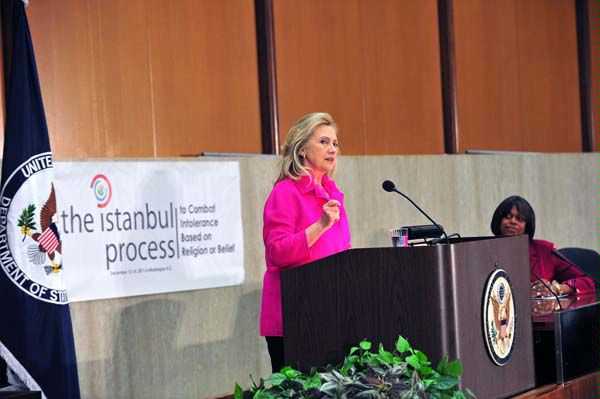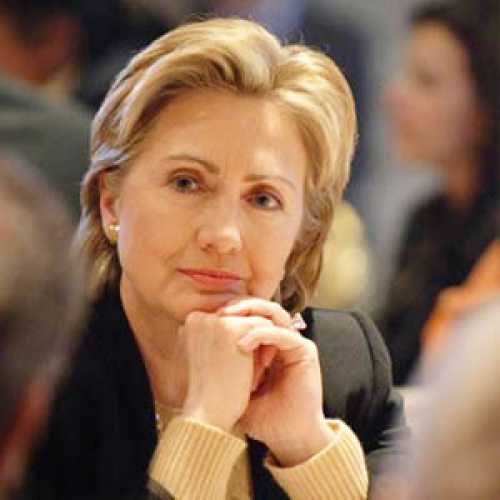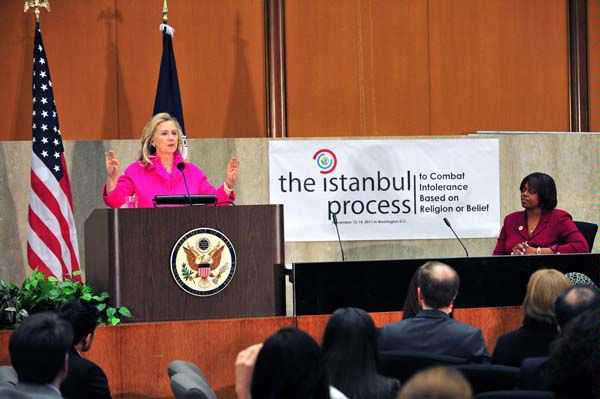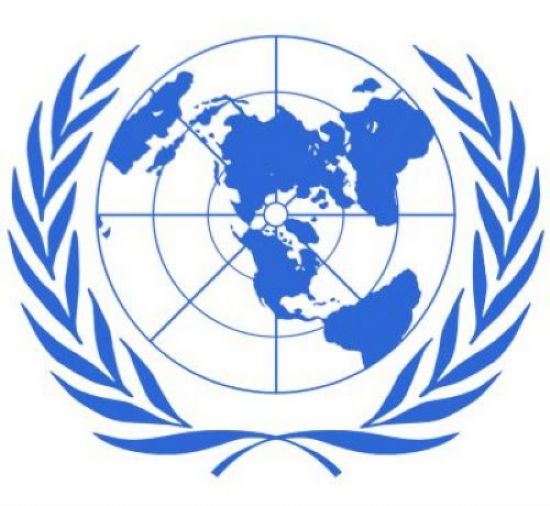12-20-2011
By Joëlle Fiss
Senior Associate, Fighting Discrimination Program
Myth vs. Reality on U.S. Engagement with Islamic States
Yesterday, in an historic vote, the United Nations General Assembly adopted a resolution on combating religious intolerance.
The novelty of this text is that it does not include the harmful concept of “defamation of religions.” Instead, the General Assembly resolution calls on governments to speak out and to condemn hatred, while encouraging open debate, human rights education, and interfaith and intercultural initiatives.
The resolution marks a welcome departure from previous U.N texts. For over a decade, efforts were made in several venues at the U.N. to promote the concept that was intended to prohibit “defamation of religions.” What it did, in fact, was provide cover for abusive national blasphemy laws. Human Rights First has long argued that this concept is inconsistent with universal human rights standards that protect individuals rather than abstract ideas or religions. Indeed, blasphemy laws promote a stifling atmosphere in which governments can restrict freedom of expression, thought and religion and persecute religious minorities. Such resolutions were sponsored by the Organization of the Islamic Conference (OIC).
Last week, the U.S. government organized a two-day Istanbul Process Conference inviting experts from around the world to share best practices on how to fight discrimination based on religion or belief. Some have criticized the United States’ engagement with the O.I.C. on these issues. Human Rights First has worked for years to reverse the tide of defamation of religions at the U.N. , and has welcomed HRC resolution 16/18 as well as this most recent General Assembly resolution. We believe it is important for governments to now implement the provisions of these resolutions.
Here are some commonly expressed concerns and our response to them:
Myth 1: The U.N. resolution opens the door to limiting freedom of speech.
Wrong. The resolution acknowledges the language of article 20 of the International Covenant on Civil and Political Rights (ICCPR), notably that “any advocacy of national, racial or religious hatred that constitutes incitement to discrimination, hostility or violence shall be prohibited by law.” It calls on states to take measures “consistent with their obligations under international human rights law, to address and combat such incidents.”
The United States has a reservation to that provision, to the extent that it violates the First Amendment of the U.S. Constitution, so it is not bound by the obligation. In fact, the U.S. has the highest threshold of free speech in the world, and the U.S. government has expressed no intention of lowering those standards. However, that does not exempt all other states from their legal obligations to fight “incitement, hostility or violence” according to article 20 of the ICCPR. After all, that is what they signed up to, so they have an obligation by law to honor their commitment.
In all respects though, the implementation of Article 20 must not infringe Article 19, which reasserts everyone’s right to freedom of expression. Rather than imposing new restrictions on freedom of speech, which it does not, the new consensus resolution opens the door to an action-oriented approach to fighting religious intolerance. That is very consistent with the U.S. policies and practices – combat violence, discrimination and hatred without restricting freedom of speech. Resolution 16/18 urges states to train government officials to address religious tensions, to harmonize actions at local and national level, to raise awareness of negative stereotyping of persons, to promote interfaith and intercultural dialogue, to foster religious freedom and to speak out against intolerance (among other recommendations. The only limitation on speech that is in the operative part of the resolution is incitement to “imminent violence”, which is in accordance with US law.
Myth 2: “The Istanbul Process Conference is undermining U.S. standards on freedom of expression.”
Wrong. The U.S. will always enforce its own standards on freedom of expression; these are enshrined in this country’s Constitution. But its legal exceptionalism on freedom of speech does not necessarily mean that the U.S. administration needs to be diplomatically isolated when it comes to promoting globally the principles of freedom of speech and freedom of religion, which many in the U.S. perceive to be core and founding American values. On the contrary, since the U.S. joined the U.N. Human Rights Council, the Obama administration has openly expressed its ambition to exert leadership within the U.N. body.
The U.S. demonstrated that leadership by securing the passage of Resolution 16/18 at the Human Rights Council and by moving immediately to show through the Istanbul Process Conference that states have tools at their disposal to combat violence, discrimination and hatred without restricting free speech. This is not only important to protecting human rights, but also key to keeping the defamation concept off the U.N. agenda.
The aim of the gathering on December 12-14 was to enhance international and technical expertise on challenges that law enforcement officials and other national experts face, when tackling conflict prevention and religious intolerance. The discussions focused on the difficulties that practitioners face on the ground, such as training officials, enforcing anti-discrimination laws and collecting data on violent hate crimes. The conference also plans to collect information on government’s best practices, which could provide a useful tool. A report will be shared and made public to states and U.N. bodies. The United States should make sure that the report remains true to its intentions, which is to highlight effective practices that do not restrict speech.
Myth 3: The O.I.C. has not abandoned the concept of defamation of religions, so why bother organizing a conference if its agenda hasn’t changed?
The concept of defamation of religions – most frequently seen in national legislation in the form of blasphemy laws – has not vanished into thin air. Blasphemy laws continue to abuse human rights and to inflict brutality on innocent victims. Human Rights First’s recently updated report documents over 100 incidents from 18 countries. It illustrates how blasphemy laws are frequently invoked to stifle dissent and harass rivals. The report also shows how blasphemy laws can provide state-sanction for discrimination against minority religions and faiths. Since the laws are discriminatory in their open-endedness they enable governments through their application to essentially determine which ideas are acceptable and which are not. As such, accusations of blasphemy have led to arbitrary arrests and detentions and restrictions in the practice and worship of minority religions.
The chilling number of incidents cited in the report of angry mobs taking the law into their own hands provides a window into the violence that blasphemy or rumors of blasphemy can incite. The majority of cases of mob violence hail from Pakistan and Indonesia. Sometimes mobs target government officials for not being strict enough in their application of blasphemy laws. But the violence is most frequently directed toward religious minority communities where the practice of their religion has been deemed blasphemous or, where simply a misspoken word or alleged desecration of the Koran incites retaliation. Violence goes unpunished and sometimes it is rather the victims of the violence that are prosecuted for their role in protecting themselves, their homes, and their places of worship.
At the international level, too, certain leaders have not abandoned reference to defamation of religions. This requires continued vigilance on the part of the US and like-minded governments, as well as human rights and other civil society groups, to ensure that the momentum remains on the side of the new consensus approach.
In organizing this conference, the U.S. took the lead in demonstrating that all states can do more to combat hatred without restricting speech. Ultimately, the Istanbul process (and the U.N. resolutions that inspired it) should be judged not by the decision of the U.S. to engage other states to implement resolutions, but on the extent to which it contributes to improving the ways in which states fight religious intolerance while respecting freedom of speech.




